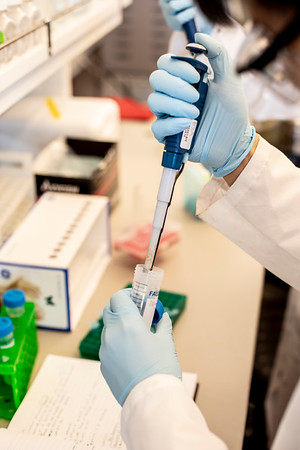
UW EXCELLENCE IN RESEARCH
Research training
Year 1: Clinical training
Years 2 & 3 (3rd year is optional for those pursuing an academic career): Focused scholarly activity (research training and/or QI project) and continuity clinics.
You Choose
AI fellows choose a focused scholarly project according to their area of interest. The fellows may choose a basic science or clinical research project with any mentor throughout the UW system and affiliated institutions. The fellows may also choose to focus on continuous quality improvement work. Upon choosing their mentor and scholarly activity project, the fellow will prepare a written research or QI project plan and establish a mentoring committee. The mentoring committee will assist in monitoring the progress of the research or QI project and oversee the preparation of abstracts/presentations/manuscripts and additional aspects of career planning for the fellow. Fellows present the products of their scholarly activities at regional, national or international meetings and publish these new data in peer-reviewed publications.
Research Training Sites
Fellows may perform research studies at one or several of the major research training sites affiliated with the program.
University of Washington - South Lake Union
Collaborative research is a hallmark of these training sites. Researchers at UW Medicine's continually expanding biotechnology and medical research hub in the South Lake Union (SLU) neighborhood of Seattle are working to develop life-changing therapies. Now housing over 1,200 scientists and support staff, the SLU complex is cutting-edge in researching areas that include Allergy and Inflammation, Immunology, Lung Biology, Metabolomics, Proteomics, and Regenerative Medicine.
Seattle Children's
At the Seattle Children’s Hospital Research Institute in downtown Seattle, the Center for Immunity and Immunotherapies (CIIT) programs include cellular therapeutics that supports current cellular therapeutic approaches, including hematopoietic stem cell transplantation and ongoing research to provide novel cellular therapies to patients with immunologic disorders, as well as gene therapy and repair that develops preclinical and clinical gene therapy protocols to treat primary immunodeficiencies and other disorders.
Benaroya Research Institute
The Benaroya Research Institute leads the Immune Tolerance Network (ITN), a collaborative network for clinical research, funded by the National Institute of Allergy and Infectious Diseases. A major focus of the ITN is the development of therapeutic approaches for asthma and allergy that lead to immune tolerance.
Research mentors
-
Matthew Altman, MD (Assistant Professor of Medicine) focuses on a systems biology approach to identifying modular repertoires of immune responses.
- Maria Teresa de la Morena, MD (Professor of Pediatrics) focuses on primary immune deficiency diseases (PID), autoimmunity, transplantation (both lung and hematopoietic cell transplantation) and HIV infection.
- Teal S. Hallstrand, MD, MPH (Associate Professor of Medicine) studies the pathogenesis of asthma through translational human studies as well as in vitro models using primary human cells and selected in vivo models.
- William Kwok, PhD (Member, Benaroya Research Institute; Affiliate Associate Professor of Medicine) studies allergen-specific CD4+ T cell responses in immunopathogenesis of allergic disorders using HLA class II tetramers.
- Hans D. Ochs, MD (Professor of Pediatrics; Jeffrey Modell Endowed Chair in Pediatric Immunology Research) focuses on the molecular basis of Primary Immune Deficiency Diseases with special interest in genes linked to Wiskott Aldrich, Hyper IgM, X-linked Agammaglobulinemia, IPEX, and Autosomal Recessive Hyper IgE syndromes.
- David J. Rawlings, MD (Professor of Pediatrics, Adjunct Professor of Immunology, Director, Center for Immunity and Immunotherapies, Seattle Children's Research Institute) investigates dysregulated B cell development and signaling leading to immunodeficiency, autoimmunity or lymphoid malignancies, and the development of gene therapy for primary immune deficiency diseases.
- Steven F. Ziegler, PhD (Member and Director, Immunology Program Benaroya Research Institute, Affiliate Professor of Immunology) investigates FoxP3 and control of CD4+CD25+ regulatory T cell development/function and the role of thymic stromal lymphopoietin (TSLP) in asthma and other allergic diseases.
Research Projects
Allergic inflammation
- Immunopathogenesis of asthma and allergic disorders
- Adaptive and innate immune responses
- Aspirin-exacerbated respiratory disease
- Food allergy
- Drug allergy
- Tolerance and autoimmunity
- Developmental immunology
- Molecular immunology focusing on molecular mechanisms involved in generating and regulating immune responses
- Epigenetic mechanisms for regulating expression of genes involved in immune responses
- Primary immunodeficiency diseases
Publications by our Fellows
- Asthma in pregnancy: a review of recent literature (Colas, K, 2024)
- Health-Related Quality of Life in 91 Patients with X-Linked Agammaglobulinemia (Altman K, 2021)
- Heme oxygenase-1 deficiency presenting with interstitial lung disease and hemophagocytic flares (Chau A, 2021)
- When long-standing hives are not chronic spontaneous urticaria (Dunn CL, 2021)
- Use of omalizumab for management of idiopathic anaphylaxis: A systematic review and retrospective case series (Aukstuolis K, 2021)
- Unique basophil microRNA signature in chronic spontaneous urticaria patients who respond to omalizumab (Al-Shaikhly T, 2019)
- Extracellular vesicle microRNAs as predictors of response to omalizumab in chronic spontaneous urticaria (Al-Shaikhly T, 2019)
- Hyper IgE syndromes: clinical and molecular characteristics (Al-Shaikhly T, 2019)
- Omalizumab for chronic urticaria in children younger than 12 years (Rosenthal J, 2019)
- Relationship Between the Location of Eosinophils in the Airway Wall, Type-2 Gene Expression, and Airway Hyperresponsiveness in Asthma (Al-Shaikhly T, 2019)
- Type-1 Interferon and Th2-Type Gene Expression Responses and Childhood Asthma (Rosenthal J, 2019)
- Interferon response to respiratory syncytial virus by bronchial epithelium from children with asthma is inversely correlated with pulmonary function (Altman M, Parker AR, 2018)
- Targeted Gene Editing Restores Regulated CD40L Function in X-linked Hyper-IgM Syndrome (Hagin D, 2018)
- Hematopoietic Stem Cell Transplantation in Patients with Gain-of-Function Signal Transducer and Activator of Transcription 1 Mutations (Hagin D, 2018)
- DOCK8 Regulates Fitness and Function of Regulatory T Cells Through Modulation of IL-2 Signaling (Hagin D, 2017)
- Regulation of Epithelial IL-33 Expression by a Mast Cell Feed Forward Loop (Altman M, 2017)
- Relationship Between Th2 Gene Mean Expression in Sputum Cells, Mast Cell Infiltration of the Airway Wall, and Airway Hyper-responsiveness in Asthma (Long S, 2016
- Safety and feasibility of oral immunotherapy to multiple allergens for food allergy (Winterroth L, 2014)
- A narrow repertoire of transcriptional modules responsive to pyogenic bacteria is impaired in patients carrying loss-of-function mutations in MYD88 or IRAK4 (Altman M, 2014)
- Exercise-induced vocal cord dysfunction and exercise-induced laryngomalacia in children and adolescents (Ayars A, 2013)
- Sputum hyaluronan and versican in severe eosinophilic asthma (Ayars A, 2013)



